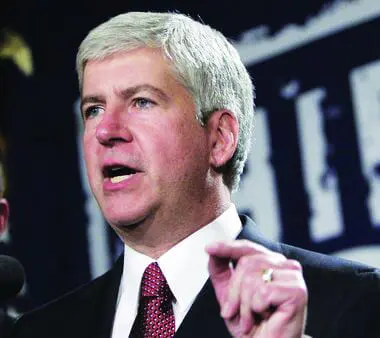
|
| Snyder. |
DETROIT — The newly-formed 15-member Middle Eastern Affairs Commission (MEAC) will act in an advisory capacity to the governor and the director of the Department of Civil Rights.
The organization is the successor to the 10-member Michigan Council on Arab and Chaldean American Affairs, created in 2013 to replace the 33-member Advisory Council on Arab and Chaldean American Affairs.
A statement from Gov. Snyder’s office said the latest reorganization and name change reflects the growing diversity of new Americans who have come to Michigan from the Middle East. The MEAC was established by executive order.
“I think the establishment of such a commission is indicative of the growing significance of the state’s Arab and Chaldean communities,” said Royal Oak businessman Michael Bsharah.
Bsharah said he hopes the commission focuses on issues that impact both communities, including immigration and civil rights.
In February, the Chaldean Chamber of Commerce filed a complaint with the Equal Employment Opportunity Commission after allegations of racism by West Bloomfield officials against Chaldean Americans surfaced.
In 2011, the Michigan Civil Rights Commission ruled in favor of Mazyn Barash, a Chaldean American and former SMART Bus mechanic who faced ethnic intimidation from co-workers and managers because of his Iraqi heritage.
Metro Detroit’s large Arab community has also faced similar challenges with discrimination and been subjected to violent hate crimes. This month ACCESS, formally known as the Arab Community Center for Economic and Social Services, asked the Michigan Civil Rights Commission to support the Take on Hate campaign which aims to fight the misconceptions and bigotry targeting Arab and Muslim Americans around the country.
“The Middle Eastern American community plays an integral role in our state and this commission will help ensure Michiganders from diverse backgrounds have the best opportunities to actively work together,” Snyder said.
Members of the MEAC are:
Dave Abdallah, realtor for Century 21 Curran & Christie. He has been with the company for more than 25 years.
Susan Dabaja, president of the Dearborn City Council and an attorney at the law firm Farhat & Associates. She is co-chair of the Dearborn Education Foundation and treasurer of the Dearborn Bar Association.
Helen Habib, retired program coordinator and foreign student advisor for the Oakland Community College Oakland Ridge Campus. She currently serves as vice president on the board of directors for the St. John/Providence Hospital Systems.
Sharif Hussein, senior vice president of the Midwest region for CNSI.
Paul Sophiea, an independent consultant specializing in health care-related fields.
Wendy Acho, director of regional business development-project sales for GeoStrategies Group, LLC.
Mariam Bazzi, assistant prosecuting attorney for Wayne County and member of the Dearborn Board of Education.
Michael Romaya, partner at the Novi-based Varnum Law Firm. He serves on the board of directors and is the secretary of the Chaldean American Chamber of Commerce.
Manal Saab, vice president of SGT Ltd. I and chair of the board of directors of the American Druze Foundation.
Suzanne Sukkar, counsel at Dickinson Wright, PLLC.
Bishr Al-Ujayli, private practice physician in Rochester Hills.
Fay Beydoun, executive director of the American Arab Chamber of Commerce.
Haifa Fakhouri, president and CEO of the Arab American and Chaldean Council.
Lina Harajli, chief operating officer of ACCESS. She has served in the roles of senior accountant, supervisor, manager and as the director of operations for ACCESS.
Abe Munkafh, chairman and CEO of Munkafh & Associates, LLC.
Appointments are not subject to the advice and consent of the Senate.
Romaya, a Chaldean American, said the establishment of the Commission is a positive sign that the governor recognizes the unique needs and concerns of the community.
“I am deeply honored by this appointment and I look forward to bringing the perspective of the Chaldean community to the Commission,” he said. “I believe it will also provide an opportunity to bring broader awareness of Middle Eastern American concerns to the general public.”
As a member of the commission, Abdullah said he looks forward to working with the governor’s office about creating more economic exchange and opportunity between Michigan and the Middle East.
Abdullah is also concerned about the challenges Arabs and Muslims face with discrimination. As a member of the commission he wants to work on helping to breakdown some of the negative stereotypes that exist about Middle Eastern Americans in the state.
“These are the things we have to fight,” Abdullah said. “We have to teach and educate people about our community.”
Dabaja said she feels strongly about the growing impact that Arab and Chaldean communities have on the economic development in Michigan. She added that it is in the best interest for both Chaldean and Arab Americans and the state to collaborate and build a stronger economic climate.
There is renewed interest in the region because of the revitalization of Detroit.
Dabaja expressed her hope that the commission can help the governor’s office work with small and large business owners and entrepreneurs to take advantage of new opportunities on all levels.
“Michigan has always taken pride in its diversity,” she said. “As a child of Lebanese immigrants, the areas of civil rights and immigration are important to me. I want to take this opportunity as a member of this commission to advise the governor’s office on the realities that Arab/Chaldean Americans face, both in terms of their civil rights and their economic challenges.”
As the president of the Dearborn City Council, Dabaja said it is important for her to have strong working relationships with local and state authorities to help benefit all the residents of the city.
“As the scope and vision of this commission becomes more focused, I will keep one thing consistent – that I will set aside partisan politics and continuously work to help build a stronger Michigan that reaps the benefits of its diverse population,” Dabaja said.






Leave a Reply